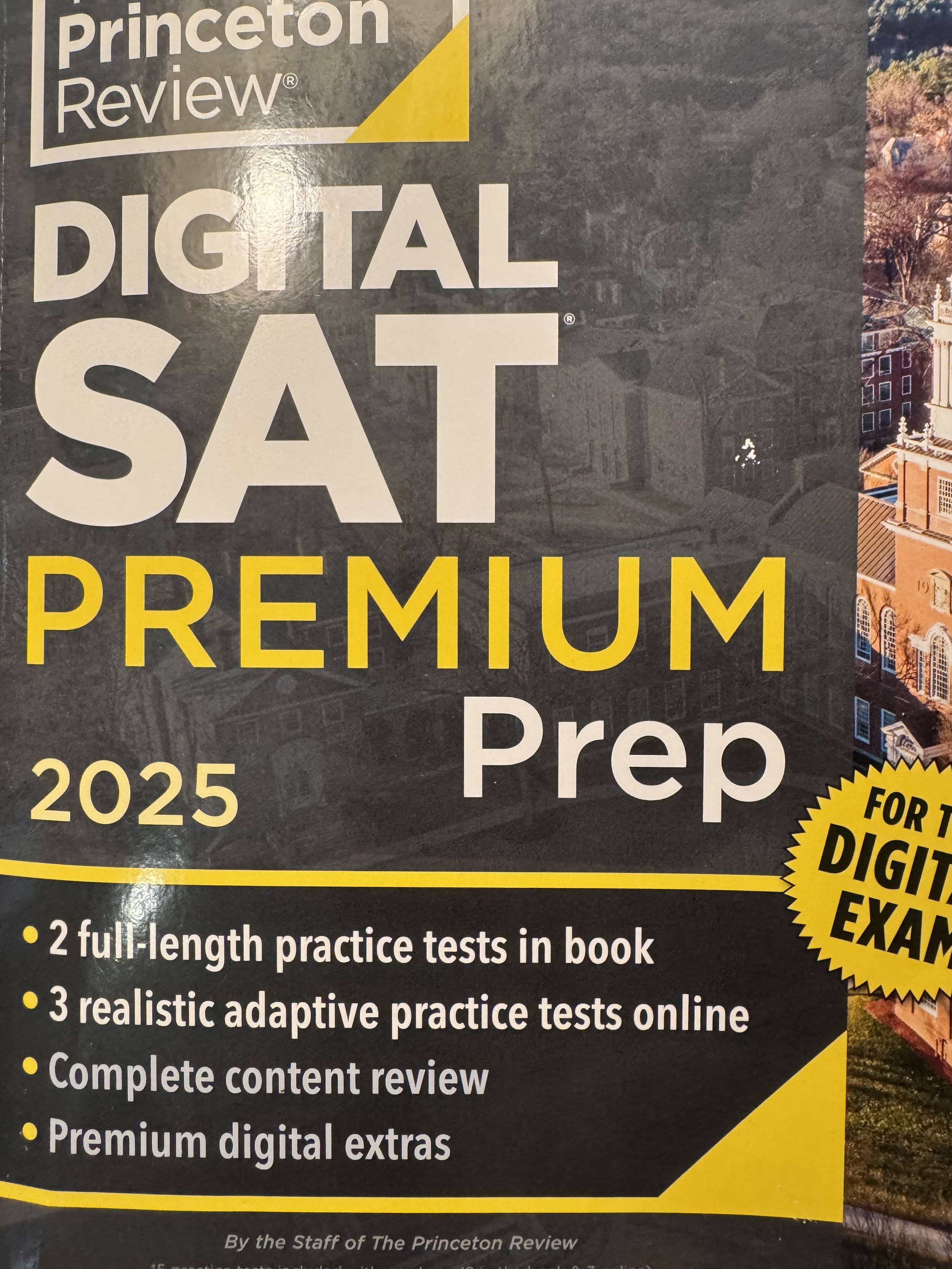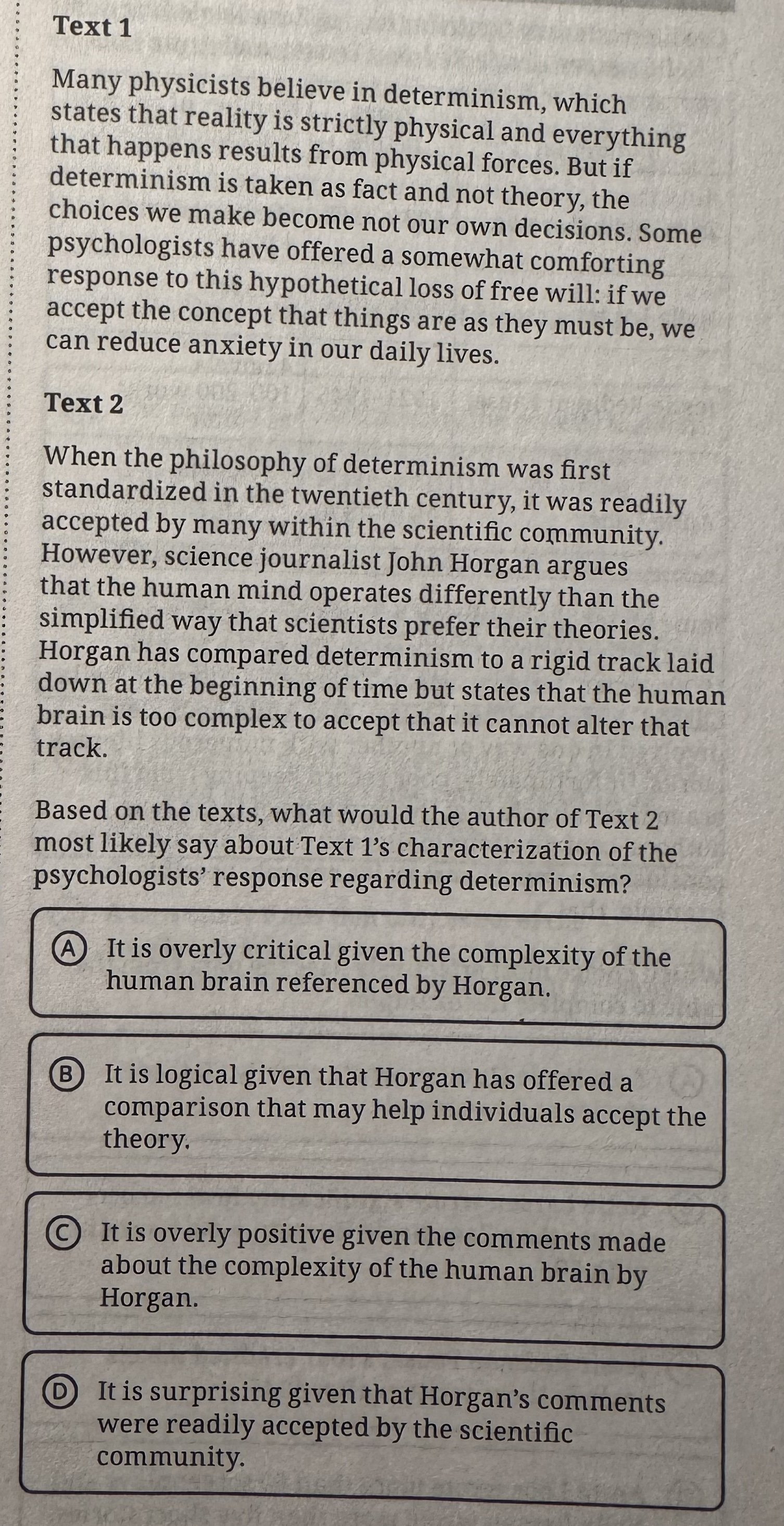Was I Fated to Be in the SAT Premium Prep Guide?
Princeton Review, which publishes this thing, mentions me in one of its multiple-choice exercises. Should I: 1, be flattered, 2, be offended, 3, ask for royalties?
HOBOKEN, JUNE 4, 2025. I recently got the following email from a professor at my school, Stevens Institute of Technology:
Yesterday, I was helping my high school aged son study for his upcoming SAT test. We were going through the book he received from his SAT prep class and reviewing problems together. When we got to one problem, I did a double take. I thought to myself, “The person this question is about is at Stevens.” Well, the person the SAT question was about was YOU! As such, I am passing the question along since I thought you might find it interesting to see what the SAT is saying about you.
She attached two images. One, above, shows the cover of DIGITAL SAT PREMIUM PREP 2025, published by Princeton Review and sold by Penguin Random House for $37.99. This book supposedly helps high schoolers ace SATs, tests with which American colleges evaluate applicants.
The other image, below, is a multiple-choice exercise in DIGITAL SAT PREMIUM PREP 2025. The exercise requires students to read two “texts” and then choose one of four possible answers to a question about them. Here’s the whole exercise:
Text 1.
Many physicists believe in determinism, which states that reality is strictly physical and everything that happens results from physical forces. But if determinism is taken as fact and not theory, the choices we make become not our own decisions. Some psychologists have offered a somewhat comforting response to this hypothetical loss of free will: if we accept the concept that things are as they must be, we can reduce anxiety in our daily lives.
Text 2.
When the philosophy of determinism was first standardized in the twentieth century, it was readily accepted by many within the scientific community. However, science journalist John Horgan argues that the human mind operates differently than the simplified way that scientists prefer their theories. Horgan has compared determinism to a rigid track laid down at the beginning of time but states that the human brain is too complex to accept that it cannot alter that track.
Based on the texts, what would the author of Text 2 most likely say about Text 1's characterization of the psychologists’ response regarding determinism?
A. It is overly critical given the complexity of the human brain referenced by Horgan.
B. It is logical given that Horgan has offered a comparison that may help individuals accept the theory.
C. It is overly positive given the comments made about the complexity of the human brain by Horgan.
D. It is surprising given that Horgan's comments were readily accepted by the scientific community.
Princeton Review says the correct answer is C, according to my Stevens colleague. She and her son both guessed wrong. I tell her I don’t know how to answer the question, because the whole exercise is so oddly and ambiguously worded.
Take, for example, this supposed paraphrase of my views: “Horgan has compared determinism to a rigid track laid down at the beginning of time but states that the human brain is too complex to accept that it cannot alter that track.” Does that mean I think determinism is wrong, or that it’s right but we can’t accept it’s right, and so we fool ourselves into thinking we have this silly thing called “free will”?
My guess is that the person who came up with this exercise for Princeton Review read my essay on the consolations of physics, including determinism. That person then produced this weirdly garbled multiple-choice exercise.
After deep deliberation, I exercise my free will and come up with a multiple-choice exercise of my own. Below I present reactions that I might have had to the Princeton Review exercise. Please choose the reaction that seems most likely.
A. What the hell??!! Life is weird.
B. This exercise is so awful!! It’s like Henry James without the high IQ. If this is any indication, the DIGITAL SAT PREMIUM PREP 2025 sucks. I pity kids who rely on it to boost their SAT scores.
C. If not even I, John Horgan, an (apparently) renowned pontificator on determinism and free will, know the “correct” response to this exercise, how can some high school kid possibly know?
D. If the questions in the prep guide are this bad, I bet some of the actual SAT questions are bad, too. Jesus, what a mess.
E. Maybe the guy who wrote this exercise is brilliant, with a doctorate in philosophy. He’s trying to prepare these kids for reading difficult texts, like those of Judith Butler. Or maybe he resents having this crappy job with Princeton Review, a dubious corporation, instead of, like, a tenured gig at Princeton University, which he definitely deserves. He’s taking his anger out on kids prepping for SATs by deliberately making exercises impossible to answer.
F. Maybe ChatGPT wrote this exercise, and that’s why it seems intelligible at first but makes less and less sense the more you think about it.
G. If the kids using this study guide had me as a teacher in high school, they’d be at a disadvantage, because I’m always blathering about how there are no “correct” answers to the questions I ask, like: Does god exist? Is reality knowable? Is “moral truth” an oxymoron? Do we have free will? My students would be looking in vain for an answer that says: There is no answer.
H. Is this something I can brag/write about? Is it cool that I’m in a book that helps sustain the academic industrial complex? Or is it kind of creepy?
I. Can I write about this in a way that plays off the theme of determinism? Maybe point out the irony of a multiple-choice question about physics-based determinism, which says all our “choices” stem not from “free will” but from a rigid chain of strictly physical causes extending all the way back to the primordial fireball? Yes, Fate decreed that Princeton Review would stick me in its SAT PREMIUM PREP and that I would write this column about it! That is totally plausible!
J. Shouldn’t I get, like, royalties or something?
K. All of the above.
If there were an answer, it would be K. But the correct answer is that there is no answer. I mean, like, duh.
Further Reading:
I Am One of Those Evil Woke Professors
Conservation of Ignorance: A New Law of Nature
The Delusion of Scientific Omniscience
I dig option D, which says “Horgan’s comments were readily accepted by the scientific community,” because, like, you know, that never happens.



